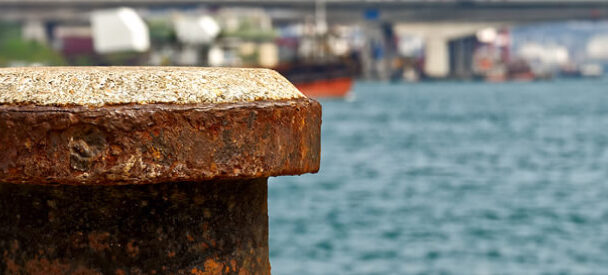LHWCA & Jones Act for Mesothelioma
Both the Jones Act and the Longshore and Harbor Workers’ Compensation Act (LHWCA) are federal laws that provide different types of maritime employees with safety standards in the workplace and rights if they’re hurt on the job.
If you’re a maritime employee who’s been diagnosed with mesothelioma or another asbestos-related disease, you may be entitled to compensation under the Jones Act or LHWCA.
As a leading national mesothelioma law firm, Simmons Hanly Conroy can help you determine if you may have a case. Call (800) 326-8900 now for a free consultation.




Fill out the form below and we’ll reach out to you.
Secure Submission
What Is the Jones Act?
Formerly known as the Merchant Marine Act of 1920, the Jones Act is a federal law that requires maritime employers and vessel-owners to provide seamen and crew members with reasonably safe working conditions on seaworthy vessels.
Because injured seamen are not entitled to workers’ compensation benefits under state or federal law, the Jones Act provides these maritime employees with the legal right to file lawsuits against their employers if negligence plays a role in the employees’ injury or illness.
This can include if you were exposed to asbestos on the job and developed an asbestos-related disease like mesothelioma decades later.
Am I Covered by the Jones Act?
The Jones Act protects seamen, offshore workers, or maritime employees who were injured or disabled during their work as a result of negligence or unseaworthiness.
To qualify as a Jones Act seaman, you must spend at least 30% of your time working on a vessel.
To be covered by the Jones Act, the boat or ship you work on also must be considered to be “in navigation” or:
- Actively in operation
- Afloat
- Capable of sailing or moving through water, even if it’s currently docked
The Jones Act doesn’t just cover physical injuries in the workplace. You may be entitled to compensation under the Jones Act if you become sick due to the poor working conditions or lack of safety precautions on the vessel that you work on.
If you or your loved one worked on the navigable waters and have since been diagnosed with an asbestos-related disease like mesothelioma, you may be eligible to file a Jones Act lawsuit to pursue compensation.
Get a free legal consultation today to see if you may be eligible to file a Jones Act claim.
Why Work with a Jones Act Lawyer?
Maritime law is a tricky field to navigate without the help of experienced legal guidance, especially when you may already be dealing with health difficulties.
A Jones Act lawyer may be able to help you:
- Determine if the Jones Act applies to you
- Gather evidence to prove your employer’s negligence
- File a Jones Act lawsuit or unseaworthiness claim
- Secure financial compensation from your employer and/or the ship-owner
- Spend more time focused on your family members and well-being, instead of the legal process
Were you or your loved one diagnosed with an asbestos-related disease (like asbestosis, lung cancer or mesothelioma) after working on a ship?
You may be entitled to compensation — get a free legal review now.
How to File a Jones Act Lawsuit
If you’re a maritime worker who was exposed to asbestos on the job, a Jones Act attorney may be able to help you receive compensation from a Jones Act lawsuit, so you can focus on your health and your loved ones.
While everyone’s case differs, the Jones Act claims process usually involves:
- Seeking medical treatment for your injuries first and foremost
- Getting a free legal consultation from experienced Jones Act lawyers, who can handle the legal process on your behalf
- Your lawyer settling the claim or filing a lawsuit against your employer
If you or your loved one suffered asbestos exposure while working as a seaman, you may be entitled to compensation from the Jones Act.
For this type of negligence claim, your Jones Act lawyer will gather evidence that establishes:
- You’re a seaman
- Your employer or co-worker was negligent in some way
- Their negligence contributed to your injury or illness
As a national mesothelioma law firm, Simmons Hanly Conroy can help clients in all 50 states and on the high seas.
Call (800) 326-8900 now to see if our Jones Act lawyers may be able to help you.
Compensation from the Jones Act
The amount of compensation you can receive under the Jones Act varies according to a number of different factors in each case, like:
- The amount of lost wages, including the loss of your future earning capacity
- Medical expenses during your recovery and after
- Pain and suffering, including mental distress
- Punitive damages
Many additional factors can affect the amount of compensation you may be awarded from your employer or the vessel owner under the Jones Act.
At Simmons Hanly Conroy, our mesothelioma lawyers have helped thousands of clients across the country recover more than $10.2 billion in total compensation for asbestos cases so far.
Get a free legal consultation today to see what your case may be worth.
Get a Free Legal Consultation
- We fight to maximize your results
- Many clients get results in as few as 90 days
- No out-of-pocket costs for you or your family
What Is the Longshore and Harbor Workers’ Compensation Act?
The United States Longshore and Harbor Workers’ Compensation Act (LHWCA) is a federal law that provides workers’ compensation benefits to maritime employees who sustained injuries while working on navigable waters.
In LHWCA cases, the navigable waters include:
- Areas neighboring a ship, like the dock, pier, wharf, station, terminal and harbor
- Other areas where a vessel might be built, repaired, loaded or unloaded
Because state and federal workers’ compensation laws don’t apply to maritime accidents or injuries, the LHWCA exists as a way to extend land-based disability benefits to employees who were injured during their duties on navigable waters.
If you were exposed to asbestos while working on navigable waters and have since been diagnosed with mesothelioma, you may be eligible to receive compensation from the LHWCA.
Get a free legal consultation today to see if you may have a maritime injury case.
Who Is Covered by the LHWCA?
The U.S. Longshore and Harbor Workers’ Compensation Act (LHWCA) covers maritime employees whose work-related injuries or asbestos exposure occurred on the navigable waters of the United States or in the adjoining areas, like docks, terminals, piers, wharves or other areas where a vessel is built, repaired, loaded or unloaded.
Traditional maritime occupations usually covered by the LHWCA include:
- Longshore workers
- Harbor construction workers
- Shipbuilders, ship-breakers and ship-repairers
Even if you don’t have a maritime job, you may still be covered by the LHWCA if your injuries or illness occurred while you were performing your job duties on navigable waters.
Additionally, if the work injury contributes to the employee’s death, the LHWCA provides survivor benefits to the employee’s dependents as well.
On the other hand, the LHWCA specifically excludes the following people:
- A master or member of a crew of any vessel (or seamen)
- Government employees
- Anyone whose injuries were caused by intoxication or willful intent to harm themselves or others
If you or your loved one was diagnosed with mesothelioma after working on navigable waters, you may be entitled to compensation from a Longshore and Harbor Workers’ Compensation Act claim.
The Longshore and Harbor Workers’ Compensation Process
Every Longshore and Harbor Workers’ Compensation Act claim is different, and claim values will vary according to the unique circumstances of each case.
Pursuing compensation through Longshore Act claims process generally involves:
- Seeking medical care and treatment for your injuries as soon as possible
- Contacting a maritime attorney, who can handle the legal process for you
By working with a maritime attorney, you can focus on your health and your family, instead of the legal process.
An experienced maritime lawyer can help:
- Gather evidence to build your case
- Keep records of your medical bills and doctor visits
- File your asbestos claim and any additional paperwork on your behalf
- Appeal the results if your claim is initially denied
If you were exposed to asbestos while working on the navigable waters and were diagnosed with mesothelioma, you may be eligible for compensation through the LHWCA.
Get in touch with a Longshore Act attorney today for help with your personal injury claim.
Finding a Longshore Act Attorney
Whether it happened on land or on navigable waters, if you were hurt on the job, you shouldn’t have to worry about whether or not you’ll be compensated for your injuries.
You should be able to focus on your health first and foremost, not your finances or filing paperwork to fight for your pay.
By working with a Longshore Act attorney, you can get help with every step of the Longshore Act claims process, so you can focus on getting better.
If you were diagnosed with mesothelioma after being exposed to asbestos while working on navigable waters, a Longshore Act attorney might be able to help you secure compensation.
Call [asbt-[phone] now to see what your legal options may be.
Maritime Lawyer FAQs
What is the difference between the Jones Act and the Longshore Act?
The Longshore and Harbor Workers’ Compensation Act (LHWCA) and the Jones Act are mutually exclusive. Each law provides compensation to employees injured at work, though they apply to different types of maritime employees.
While the Jones Act covers injured seamen and employees who work on a maritime vessel, the LHWCA covers employees who were injured during their work on navigable waters or their adjoining areas, like ports, piers, docks, and other areas where a ship is repaired, loaded or unloaded.
Not sure which applies to you? An experienced maritime lawyer can help you determine which applies to your case. Get a free legal consultation today to find out more.
Who does the Jones Act apply to?
The Jones Act applies to ship crew members, the ship captain, seamen and maritime employees who spend at least 30% of the workday performing their duties on a maritime vessel that’s considered to be “in navigation” (in operation, afloat and capable of sailing, even if docked).
This maritime act provides workers’ compensation coverage in the event of an employee’s injury as a result of their employer’s negligence or an unseaworthy vessel.
What is USL&H?
The United States Longshore and Harbor Workers’ Compensation Act (sometimes called the USL&H) is a federal law that provides workers compensation to maritime employees who were injured during their work on the navigable waters or in the adjoining areas (like ports, wharfs, docks, piers and other locations where a vessel is loaded, unloaded or built).
What is the statute of limitations on the Jones Act and LHWCA?
The Longshore and Harbor Workers’ Compensation Act statute of limitations and Jones Act statute of limitations will be different depending on where you file your claim. Once the statute of limitations passes for your claim, however, you won’t be able to pursue compensation for your injury in the future.
If you or your loved one was diagnosed with mesothelioma after working on navigable waters, be sure to get a free legal consultation from experienced maritime attorneys as soon as possible.
Can I be fired for filing a Jones Act lawsuit or LHWCA claim?
No — it is considered unlawful for an employer to discriminate or retaliate against an employee by firing them for filing a claim for compensation.
If your employer has acted in such a manner or threatened to, bring the matter to the attention of your maritime lawyer.





